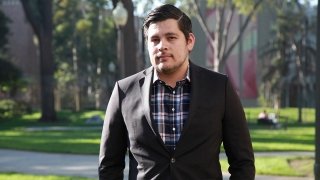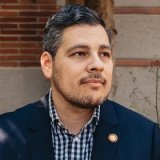Incoming Assistant Professor of Education Stephen J. Aguilar knows firsthand what it’s like to be faced with the tough decision to change out of a STEM major.
“When I took my first computer science midterm I completely bombed it,” says Aguilar, “and if you think about it, failing is something that happens all the time within the computer science community.” The son of Mexican immigrants, Aguilar grew up attending public schools in Colton, a predominantly Latino community of 50,000 about 60 miles east of Los Angeles.
Technically-minded, he would often spend time after school at his father’s business, where he helped fix broken word processors and other office equipment brought in by customers.
Yet, like many secondary students of color who don’t have access to high quality STEM instruction, Aguilar wasn’t prepared for college-level computer science work — and meeting with the professor after the botched midterm quashed any hopes he could recover. “When I spoke to him about my grade, he said, ‘You cannot pass my class because I curve. Even if you got 100 percent on the final, you would still get an F in the class.’”
“So, I was basically weeded out of computer science,” and with bittersweet laughter Aguilar notes that “the worst part of the whole ordeal was that the midterm wasn’t even a project, it was handwritten C code on paper.” After a brief stint as an undeclared major, Aguilar chose to double major in psychology and philosophy — taking graduate courses in the latter during his senior year at Georgetown University.
A desire to level the educational playing field motivated him to join Teach For America after graduation. “My current research is informed by the fact that I was a classroom teacher for a couple of years in a very challenging environment where you want to be as effective as you can without burning out,” he says of his time teaching middle school in East Palo Alto, Calif. A master’s degree from the University of Chicago and a doctorate in education and psychology from the University of Michigan soon followed.
Now he is transitioning from a postdoctoral fellowship at USC Rossier to tenure-track faculty in the fall, and is the associate director of the Center for Empowered Learning and Development with Technology (CELDTech).
Despite not majoring in STEM, Aguilar is developing a research agenda centered on his first love: technology.
“I’m hoping to reshape the way we approach technology in the classroom,” says Aguilar. “It’s not about saying, ‘Here’s a widget,’ chuck it in these classrooms and that’ll make students learn better.”
Instead, Aguilar cares deeply about “giving teachers the tools and training they need, and ensuring technology is designed to give students what they need, when they need it.”
Learning analytics, Aguilar argues, “is one of the ways we can support individualized learning — but to do it right, learning analytics-based technologies must also be attuned to students’ histories and cultures.”
For Aguilar, getting it right is personal. “English is my dominant language, but my first language is Spanish,” he says. “My first memory of kindergarten was actually crying because I didn’t understand the teacher’s directions well enough.”
Aguilar believes that technology can facilitate and celebrate individual differences. “The world works differently for different people,” says Aguilar, “and if we actually care about teaching individuals, we must acknowledge and design for these differences.”
Video




